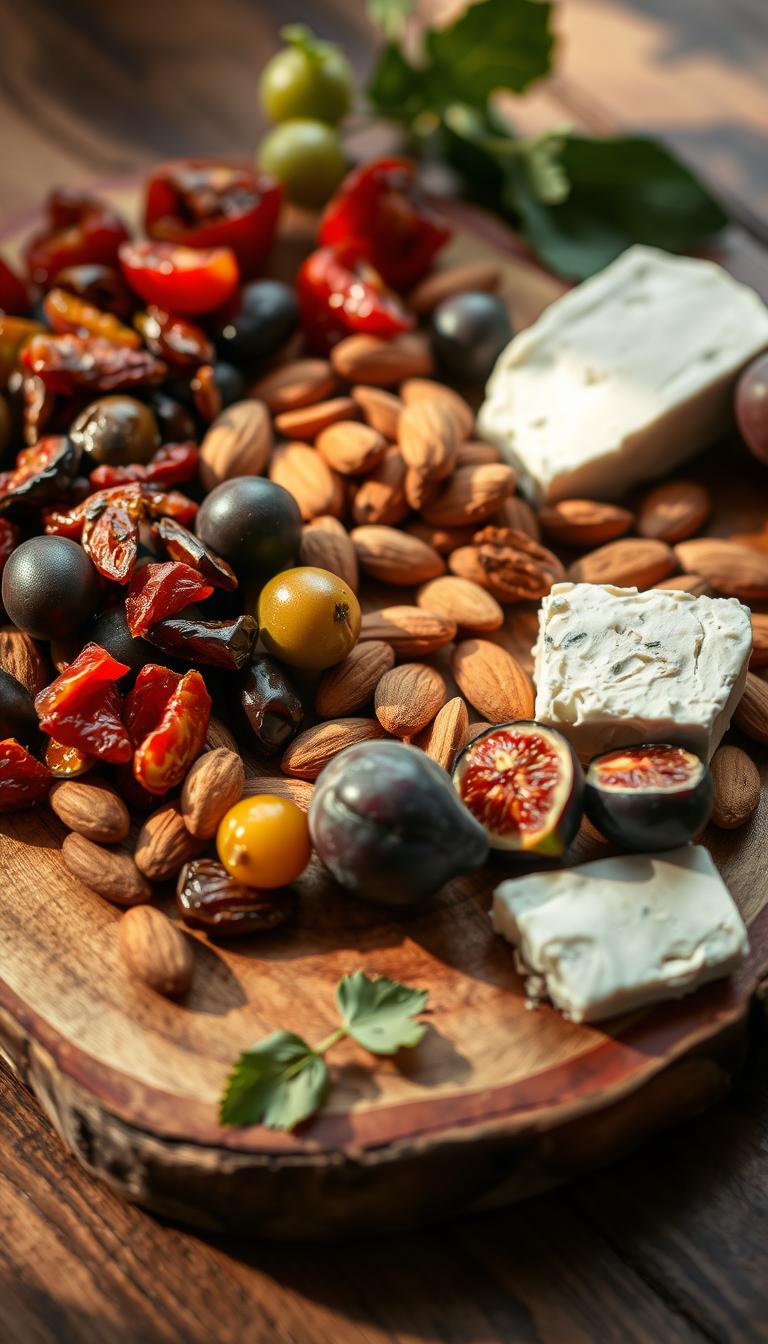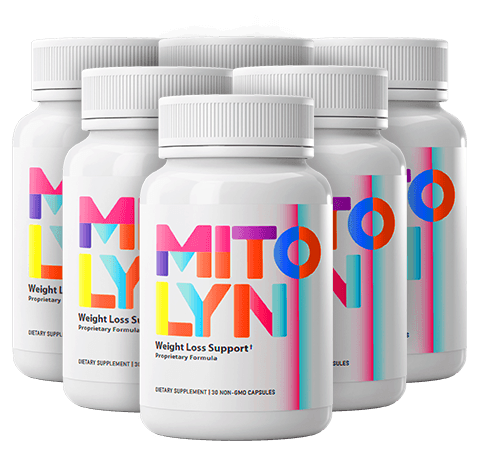
Are you ready to start a journey to better health? The Mediterranean diet is great for improving your health. You’ll need to know how to shop for it, make a list, and plan your meals. Focus on whole foods like fruits, veggies, grains, and lean proteins.
Understanding the Mediterranean Diet
The Mediterranean diet is balanced and good for your heart. It helps with weight loss and lowers disease risk. You’ll eat whole foods, including carbs, proteins, and fats. Plan your meals to make shopping easier.
Getting Started
To start your Mediterranean diet, learn how to shop for it. Make a list, plan your meals, and know the diet’s basics. Eating whole foods helps your health and wellbeing.
Key Takeaways
- Focus on whole, unprocessed foods, including fruits, vegetables, whole grains, and lean protein sources.
- Create a Mediterranean diet shopping list to help you stay on track.
- Plan your Mediterranean diet meal planning in advance to maximize grocery shopping efficiency and cost-effectiveness.
- Incorporate a variety of high-fiber carbohydrates, lean protein sources, and healthy fats into your diet.
- Aim to include 3 or more servings of vegetables and 3 servings of fruits in your daily diet.
- Choose whole grain products and healthy fats, such as nuts, seeds, and olive oil, to support your overall health and wellbeing.
Understanding the Mediterranean Diet
The Mediterranean diet focuses on eating whole, unprocessed foods. It also promotes a balanced lifestyle. By adding Mediterranean diet recipes to your daily meals, you can boost your health and wellbeing. It’s not just about food; it’s also about how you live and interact with your world.
A Mediterranean diet food guide suggests eating lots of fruits, veggies, whole grains, and healthy fats like olive oil. The Best foods for Mediterranean diet include leafy greens, tomatoes, squash, peppers, cucumbers, and avocados. You can also enjoy whole grains like brown rice, quinoa, and whole-wheat pasta.
To make the most of the Mediterranean diet, choose whole, unprocessed foods. Try to eat less saturated fats, sugar, and refined grains. With a bit of planning and creativity, you can make tasty and healthy Mediterranean diet recipes. These recipes will help you reach your health goals.
Planning Your Grocery List
To start the Mediterranean diet, planning your grocery list is key. You need to list essential items like olive oil, whole grains, and lean proteins. Also, focus on seasonal produce. These tips will help you prepare tasty and healthy Mediterranean meals.
Your Mediterranean diet grocery haul should have fruits, veggies, whole grains, and healthy fats. Try to eat at least 3 servings of fresh fruits and veggies daily. Choose whole grains over refined carbs. Remember to include nuts, seeds, and olive oil too.
- Include a variety of colorful vegetables to ensure you’re getting a range of nutrients
- Choose whole grains like brown rice, quinoa, and whole-wheat bread
- Select lean protein sources like poultry, fish, and legumes
By following these tips and making a good grocery list, you’ll adopt healthy eating habits.
Choosing the Right Groceries
Following a Mediterranean diet on a budget means picking the right foods. You should look for whole grains, fresh fruits and vegetables, and healthy fats. These foods give you the nutrients you need.
Colorful vegetables like red, blue, and purple are great. They offer different health benefits.
To stay on track, aim for half your plate to be non-starchy veggies. A quarter should be protein, and a quarter should be high-fiber carbs.
Make sure to buy 2-3 fresh or frozen non-starchy veggies. Also, get 1-2 bags of leafy greens and 2-3 fresh fruits. Don’t forget grains that are running low, 1-2 starchy veggies, and a fish or lean protein.

Legumes like beans and lentils are full of nutrients. They help lower the risk of insulin resistance.
Fatty fish like salmon and herring are rich in omega-3s. These fats reduce inflammation and improve insulin sensitivity.
By adding these foods to your diet, you’ll get the nutrients you need. This helps keep your diet healthy and balanced.
Navigating the Supermarket Aisles
When you’re in the supermarket, having a plan is key. It helps you make healthy choices. Learning how to grocery shop for Mediterranean diet can seem hard. But, with some tips, you can get better at it.
Start by reading food labels. Also, shop around the store’s edges for whole foods. This way, you avoid processed stuff.
A good Mediterranean diet shopping list keeps you on track. It helps you avoid buying junk food. Buy seasonal produce to save money and get fresh food.
Freezing fruits and veggies is also smart. They’re as good as fresh ones.
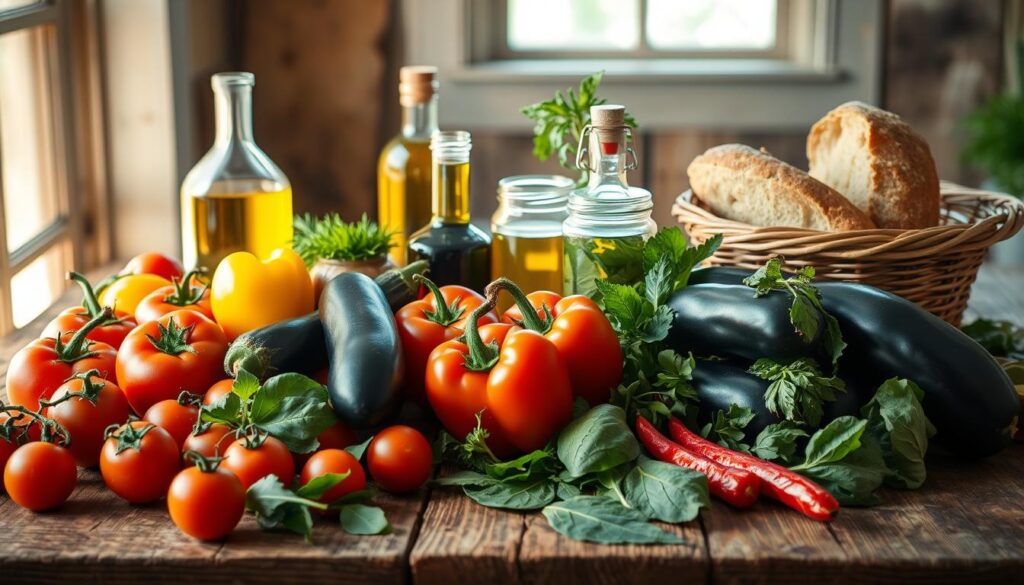
Here are some tips for supermarket shopping:
* First, shop the edges for fresh stuff.
* Stay away from processed foods and sugary snacks.
* Eat whole grains, beans, and legumes.
* Use herbs and spices for flavor instead of salt and sugar.
By following these tips, you can make better choices. And, you’ll have a great Mediterranean diet shopping list.
Exploring Local Markets
As you keep going on your Mediterranean diet journey, local markets are a great place to find fresh food. You can find new Mediterranean diet recipes and ingredients at farmers’ markets. A Mediterranean diet food guide often suggests shopping at local markets for the best produce.
At local markets, you can find lots of fresh fruits and veggies. These are perfect for making tasty Mediterranean diet recipes. Some popular items include:
- Fresh seafood
- Artisan cheeses
- Locally grown fruits and vegetables
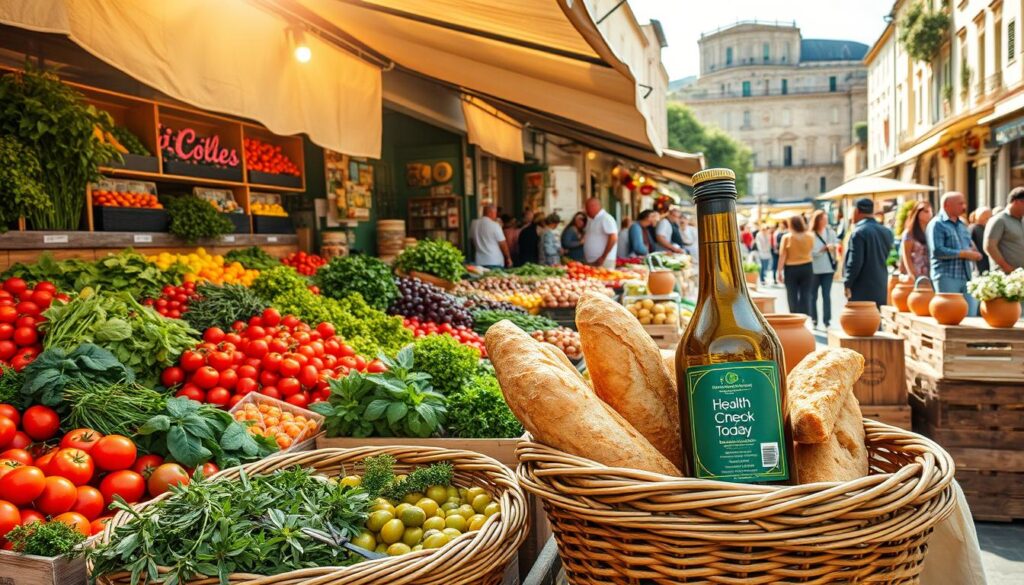
To get the most from your local market visit, go on Saturdays. Many markets are open then. You can also try daily markets, like Peterson Groves in Vero Beach, a few times a month. By exploring local markets and following a Mediterranean diet food guide, you can make healthy and tasty Mediterranean diet recipes. These will help you stay on track with your diet goals.
Incorporating Plant-Based Foods
Exploring the Mediterranean diet shows how plant-based foods add variety and nutrition. This diet focuses on whole foods from plants. These include fruits, vegetables, grains, legumes, nuts, seeds, herbs, and spices.
For Mediterranean diet shopping, choose whole grains like barley, buckwheat, and brown rice. They last up to six months in a cool, dry pantry or a year in the freezer. Also, pick a variety of fruits and vegetables. Aim for 7 to 10 servings a day for health benefits.
Some plant-based foods to try are:
- Legumes, such as beans and lentils, which are rich in protein and fiber
- Nuts and seeds, like almonds and sesame seeds, which provide healthy fats and crunch
- Whole grains, such as oats and polenta, which offer sustained energy and fiber
Try new vegetables and plant-based proteins to make meals interesting and healthy. With these tips and a good grocery haul, you’ll enjoy a healthier diet.

Choosing Quality Proteins
When you’re on a budget, picking good proteins is key. You can eat a lot of different proteins like seafood, lean meats, and poultry. Foods like salmon and herring are full of omega-3s.

Best Seafood Choices
Seafood is a top protein in the Mediterranean diet. You can pick from many seafood types, like fish, shellfish, and mollusks. Salmon, sardines, and anchovies are some of the best choices.
Lean Meats and Poultry Options
Lean meats and poultry are also good for protein. You can choose chicken, turkey, and lean beef. Opt for grass-fed and organic to get the best quality.
Plant-Based Proteins Explained
Plant-based proteins are great for a budget-friendly Mediterranean diet. You can eat legumes, beans, and lentils. They’re not only cheap but also full of fiber and nutrients.
Making Smart Beverage Choices
Following the Mediterranean diet means choosing the right drinks. It’s key to stay hydrated and lower disease risk. Include lots of water and herbal teas in your diet. Water is vital for health, and herbal teas add antioxidants and flavor without sugar.
Drinking water and herbal teas helps you stay hydrated. Some popular herbal teas are peppermint, chamomile, and hibiscus. You can find them in health stores or online. Also, a little red wine is part of the Mediterranean diet. It may help lower heart disease risk when drunk in small amounts.
It’s important to avoid sugary drinks for a healthy Mediterranean diet. Here are some good alternatives:
- Infused water with fruits or herbs
- Seltzer water with a squeeze of lemon or lime
- Unsweetened tea or coffee
By choosing wisely, you keep hydrated and lower disease risk. This follows the Mediterranean diet’s principles. It also helps you make a balanced shopping list.

Storing Your Groceries Properly
Following Mediterranean diet recipes means having the right ingredients. A well-stocked pantry and fridge are key. Proper storage keeps food fresh, reduces waste, and supplies you with what you need.
Start with fresh produce. Keep fruits and veggies separate to avoid moisture. Use airtight containers for grains and legumes. Store proteins in the fridge at 40°F (4°C) or below to stop bacteria.

Follow these tips to keep your food fresh. Always check expiration dates and use the “first in, first out” rule. With good storage and planning, you can enjoy the Mediterranean diet’s benefits and make tasty meals.
Cooking at Home for Success
Cooking at home is key to the Mediterranean diet. It lets you make healthy and tasty meals. By using Mediterranean diet shopping tips, you can get the right ingredients. A good Mediterranean diet grocery haul keeps you on track.
Simple recipes include grilled chicken or fish with veggies, and salads with greens, fruits, and nuts. You can also cook in batches for busy times. This saves you time later.
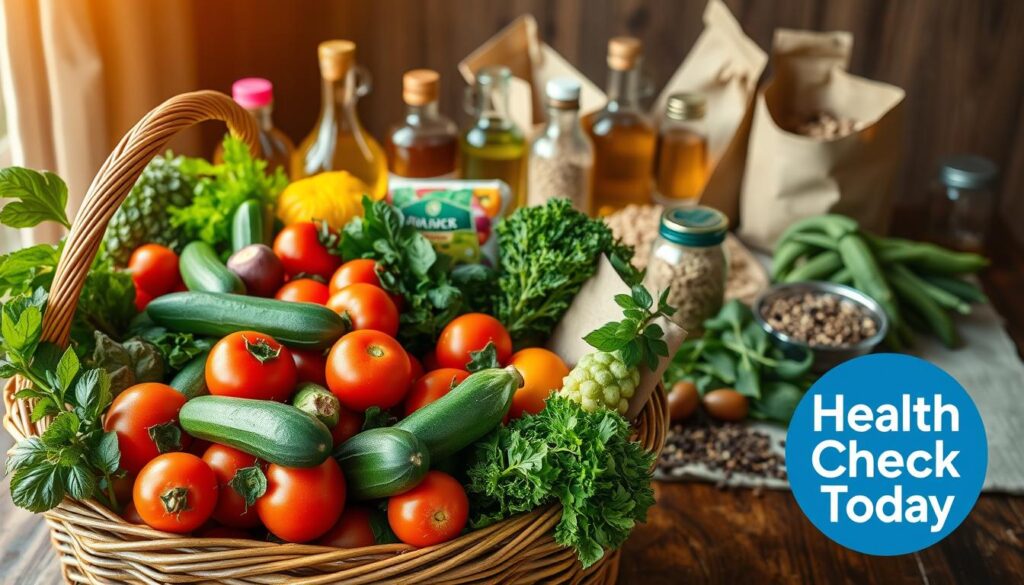
Simple Mediterranean Recipes
- Grilled chicken or fish with roasted vegetables
- Salads with mixed greens, fruits, and nuts
- Legume-based dishes, such as lentil soup or chickpea salad
Batch Cooking for Busy Weeks
Batch cooking saves time during the week. Cook big batches of rice or quinoa. Then, use it in different meals all week.
Staying Motivated with Your Diet
Staying motivated with your diet is key to long-term success. When you follow the Mediterranean diet on a budget, set realistic goals. Also, find support groups or communities that share your interests. Celebrating your progress, no matter how small, can also help you stay motivated and engaged with your diet.
To make the most of the Mediterranean diet, focus on the best foods for it. This includes fruits, vegetables, whole grains, and lean proteins. By making a few simple changes to your daily routine, you can enjoy the many benefits of the Mediterranean diet while staying within your budget.
Some tips for staying motivated include:
- Setting achievable goals, such as trying a new recipe each week
- Finding a support group or community to share tips and advice
- Celebrating your progress, no matter how small, to stay motivated and engaged
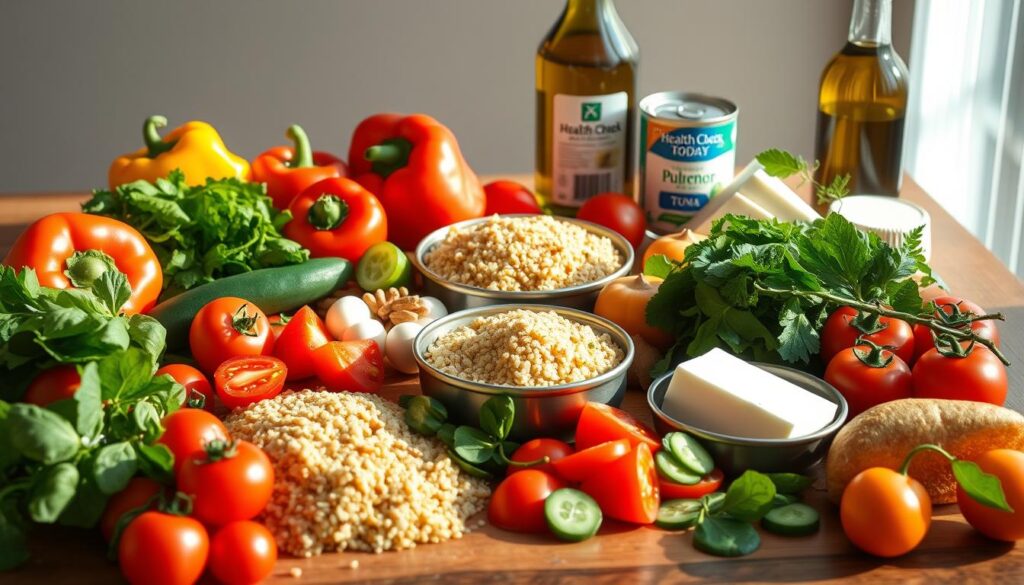
By following these tips and staying committed to your diet, you can enjoy the many benefits of the Mediterranean diet. This includes improved health and wellbeing, all while staying within your budget.
Reviewing Your Grocery Shopping Routine
As you keep following the Mediterranean diet, check your grocery shopping often. This helps you see what’s working and make changes. You can save money by buying what’s in season and looking for deals.
Evaluate and Adjust
Look at your past grocery trips and what you bought. Are you getting the right foods like fruits, grains, and lean meats? If not, find ways to improve. Swap unhealthy foods for better ones that fit the diet.
Seasonal Shifts
What you can buy and how much it costs changes with the seasons. Update your list to match what’s in season. This saves money and gets you the best flavors for your Mediterranean diet meals.
Budget-Friendly Strategies
Following the Mediterranean diet doesn’t have to cost a lot. Find ways to stretch your money, like buying in bulk or using frozen foods. Focus on whole foods, which are often cheaper than processed ones.







